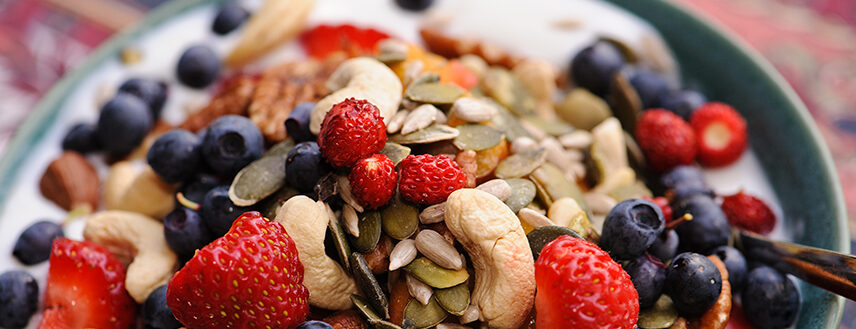
Healthy eating decreases your risk of diabetes, hypertension, and heart disease. According to a recent study, we can add brain health to that list of benefits. An international team of researchers found that seniors who consumed the most nutritious brain boosting food had a nearly 25 percent reduction in the risk of mental decline compared to those with the least healthy diets, according to the study published in Neurology. Here are some of the best brain boosting foods researchers recommend:
- Blueberries – Scientists at Tufts University suggest that the consumption of blueberries may be effective in improving or delaying short-term memory loss.
- Pumpkin Seeds – A perfect snack for busy days – just a handful of pumpkin seeds a day is all you need to get your recommended daily allowance of zinc, which is vital for enhancing memory and thinking skills.
- Whole Grains – Your brain needs energy. The ability to concentrate and focus comes from the adequate, steady supply of energy – in the form of glucose in our blood to the brain. You can achieve this by choosing whole grains, which release glucose slowly into the bloodstream, keeping you mentally alert throughout the day.
- B Vitamins – Certain B vitamins – B6, B12 and folic acid – are known to reduce levels of homocysteine in the blood. Elevated levels of homocysteine are associated with increased risk of stroke, cognitive impairment and Alzheimer’s disease. A study of a group of elderly patients with mild cognitive impairment found that after two years of intervention with high doses of B6, B12 and folic acid there was significantly less brain shrinkage compared to a subset given placebo treatment.
- Oily Fish – Our bodies cannot manufacture essential fatty acids (EFAs). They must be obtained through diet. The most effective omega-3 fats occur naturally in oily fish as EPA and DHA. Good sources include flaxseed oil, soya bean oil, pumpkin seeds, walnut oil and soya beans. They are good for healthy brain function, the heart, joints and general wellbeing. Oily fish contains EPA and DHA in a ready-made form, which enables the body to use it easily. The main sources of oily fish include salmon, trout, mackerel, herring, sardines, pilchards and kippers. Low DHA levels have been linked to a higher risk of developing Alzheimer’s disease and memory loss.
- Tomatoes – There is good evidence to suggest that lycopene, a powerful antioxidant found in tomatoes, could help protect against the kind of free radical damage to cells which occurs in the development of dementia, particularly Alzheimer’s.
- Broccoli – A great source of vitamin K, which is known to enhance cognitive function and improve brainpower.
- Nuts – A study published in the American Journal of Epidemiology suggests that an intake of vitamin E might help to prevent cognitive decline, particularly in the elderly. Nuts are a great source of vitamin E along with leafy green vegetables, asparagus, olives, seeds, eggs, brown rice and whole grains.

Leave a Reply